Completes 25 years of sustained growth
Alok Industries Ltd., one of India’s largest vertically integrated textile companies, has completed 25 years in business. With its humble beginning way back in 1986 as a polyester yarn manufacturer, Alok today is amongst India’s leading textile companies providing integrated textile solutions across the value chain, from yarn, apparel fabrics, home textiles, technical textiles and apparels in all natural and man-made fibers.
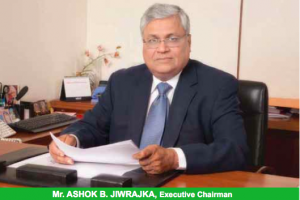 Mr. Ashok B. Jiwrajka, Executive Chairman, Alok Industries, said: “Alok has evolved into an integrated manufacturer and has emerged as world class textile solution provider in apparel fabrics, home textiles, garments, and polyester yarns, selling directly to some of the world’s top brands and retailers, manufacturers, exporters and importers. Our core textiles business has the unique positioning of being integrated across the cotton and polyester fibre production chains and has the flexibilities in capacity to optimise opportunities in the ever changing market. In addition, during this period, we have established strong relationships with sales channels and customers, both in the domestic and export markets”.
Mr. Ashok B. Jiwrajka, Executive Chairman, Alok Industries, said: “Alok has evolved into an integrated manufacturer and has emerged as world class textile solution provider in apparel fabrics, home textiles, garments, and polyester yarns, selling directly to some of the world’s top brands and retailers, manufacturers, exporters and importers. Our core textiles business has the unique positioning of being integrated across the cotton and polyester fibre production chains and has the flexibilities in capacity to optimise opportunities in the ever changing market. In addition, during this period, we have established strong relationships with sales channels and customers, both in the domestic and export markets”.
“We have gained a strong footing in the global textiles and apparels market, completed projects and commissioned capacities across products according to plans, and grown into a company with a turnover over of Rs. 6,388 crores in 2010-11 and emerged as one of the largest integrated textile manufacturing companies in the global textile market. Today, it gives me and the team at Alok even more satisfaction to look forward at the potential for quantum growth that lay ahead. The spade work has been done and most of the large investments are in place. The next decade will be about sweating assets and reaping benefits while maintaining the growth momentum”, he added.
Alok’s blue chip international customer base comprises world renowned retailers, importers and brands. About 35 per cent of its production is exported to over 70 countries, the major markets being the US, Europe, Latin America, Asia and Africa. Carefully planned expansion and marketing strategies have enabled the company to achieve a CAGR of 35 per cent in sales since inception.
In the first six months of the current financial year, Alok Industries clocked net sales of Rs. 3,781.68 crores, an increase of 48.27 per cent over the same period last year. Exports grew by 28.89 per cent to Rs. 1,342.23 crores from Rs. 1,041.38 crores. Profit stood at Rs. 139.48 crores as against Rs. 126.32 crores, a growth of 10.42 per cent.
Alok has capacities of 82.50 million metres of sheeting fabric and 6,700 tons of terry towels for its home textiles business, 186.00 million metres of apparel width woven fabrics, 18,200 tons per annum of knitted fabrics and 22 million pieces per annum of garments. The company which has achieved complete integration. It has its strong presence in the polyester segment with a capacity of 1,14,000 tons per annum of polyester textured yarn, supplemented by 3,00,000 tons per annum of POY.
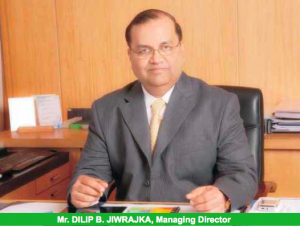 The retail operations, both at home and in the UK, are starting to gain traction and moving towards profitability. The ‘H&A’ chain of stores continued to spread its wings across India with a total of 291 outlets (including shop-in-shop) by the end of 2010-11. The target is to have about 500 stores operational over the next two years.
The retail operations, both at home and in the UK, are starting to gain traction and moving towards profitability. The ‘H&A’ chain of stores continued to spread its wings across India with a total of 291 outlets (including shop-in-shop) by the end of 2010-11. The target is to have about 500 stores operational over the next two years.
Alok H&A Ltd. recorded sales of Rs. 40.37 crores in 2010-11 and generated cash profits. ‘Store Twenty One’, the UK retail chain of value-format stores, did reasonably well during the year. For the 12-month period ended March 2011, the stores registered sales of £129.75 million as compared to £117.06 million in FY 2010, a growth of 10.84 per cent.
Even the international operations of the Czech subsidiary – Mileta – have turned around. Net sales grew by 3.02 per cent from Euro 19.85 million in 2009-10 to Euro 20.45 million in 2010-11. This revenue growth has contributed to PBT turning around from a deficit of – Euro 1.54 million in 2009-10 to a profit of Euro 0.70 million in 2010-11.
In 2010-11, Alok Industries has invested Rs. 1,858.81 crores across various divisions. A major portion of this was towards cotton spinning, expansion of weaving and processing capacities, setting up of the additional continuous polymerization (CP) plant, and expansion of the texturising plant and regular capex.
Spinning, weaving and knitting
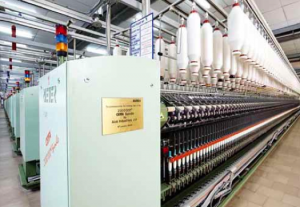 From an initial capacity of 50,000 spindles in 2007, Alok has today created India’s largest spinning capacity at one location (Silvassa) with 4,11,840 spindles and 5,680 rotors to produce about 80,000 tons of cotton yarn per annum. Almost 95 per cent of this yarn is consumed in-house for fabric production, making it the strongest vertical integration of textiles in India.
From an initial capacity of 50,000 spindles in 2007, Alok has today created India’s largest spinning capacity at one location (Silvassa) with 4,11,840 spindles and 5,680 rotors to produce about 80,000 tons of cotton yarn per annum. Almost 95 per cent of this yarn is consumed in-house for fabric production, making it the strongest vertical integration of textiles in India.
Alok’s requirement of cotton yarn increased considerably with the expansion of weaving and knitting capacities and made strategic sense to have some portion of its total yarn requirement produced in-house. This also mitigates the risk of total dependence on the market where availability could be a constraint with a lot of high-speed weaving capacities being added in the country in the quota-free regime. Consequently, the size of the cotton yarn division has become larger.
The company initially set up a weaving unit at Bhiwandi way back in 1991 with about 100 shuttle looms. Today it has about 2,200 shuttleless looms comprising of rapier, air jet and jacquard looms in one complex at Silvassa. This is possibly the highest number of looms at one location in the country. Also, at this location, about 1,000 looms are installed in one weaving unit, making it probably the largest weaving unit in the world.
Alok produces a wide range of woven and knitted fabrics. The high quality of its products is the result of its design capabilities, product knowledge and state-of-the-art manufacturing facilities. On the weaving front it has modern facilities that utilise the best technology available in the world. This includes Benninger warping and sizing machines from Switzerland for preparatory, projectile Sulzer make looms, wider width / narrow width airjet looms of Toyota / Picanol make, Rapier Sulzer make looms with Staubli make dobby and Rapier Sulzer make looms with Bonas make Jacquard attachment.
 The company also outsources fabrics from powerlooms and mills to meet its requirements. Presently, the company has 1,018 apparel width looms with an installed capacity of 93 million metres and 855 wider width looms with an installed capacity of 68 million metres.
The company also outsources fabrics from powerlooms and mills to meet its requirements. Presently, the company has 1,018 apparel width looms with an installed capacity of 93 million metres and 855 wider width looms with an installed capacity of 68 million metres.
In weaving, the company, under its ongoing expansion programme, proposes to install 200 Toyota make airjet wider width looms with an installed capacity of 24 million metres. It is also installing 120 normal width Picanol make airjet / rapier looms with an installed capacity of 27 million metres. Thus the total weaving capacity would increase to 212 million metres and the total number of looms to 2,183. Looking to the growing demand for the knitted fabrics, the company is further expanding its capacities by installing additional circular knitting machines, taking the total capacity to 25,000 tpa.
In knitting, the company currently has 171 Mayer and Cie / Pailung circular knitting machines of various types like single jersey, double jersey, interlock, auto striper and rib structure. The total installed capacity is 18,200 tpa. The products include single jersey, double jersey, interlock, ribs, jacquards and auto striper, and the fibres used include cottons, blends of cotton with polyester or viscose, polyester, viscose and Lycra blended.
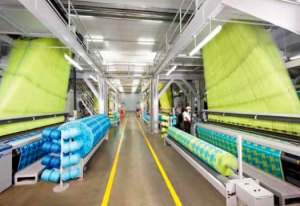 In an unfortunate incident on August 16, 2007, Alok’s texturising unit at Silvassa with 70 texturising machines was totally gutted in a fire. The company rebuilt a new texturising plant at the same location with 35 new texturising machines in about 90 days and restarted production on November 24, 2007. This record performance was made possible with the commissioning of nearly 2,000 people through separate contractors simultaneously and the ample support from the business associates. From the current 92, by the end of March 2012 Alok will have a total of 140 texturising machines, producing 1,70,000 tons of texturised yarn per annum, making it the largest capacity in the industry.
In an unfortunate incident on August 16, 2007, Alok’s texturising unit at Silvassa with 70 texturising machines was totally gutted in a fire. The company rebuilt a new texturising plant at the same location with 35 new texturising machines in about 90 days and restarted production on November 24, 2007. This record performance was made possible with the commissioning of nearly 2,000 people through separate contractors simultaneously and the ample support from the business associates. From the current 92, by the end of March 2012 Alok will have a total of 140 texturising machines, producing 1,70,000 tons of texturised yarn per annum, making it the largest capacity in the industry.
In 2001, Alok was amongst the first to invest under the Technology Upgradation Fund Scheme (TUFS) where 5 per cent interest subsidy is available on eligible loans. Since the abolition of textile quotas in global trade in January 2005, Alok has invested over Rs. 9,000 cores (about $2 billion) in seven years, perhaps the largest capex in the Indian textile industry. It is also the largest beneficiary of TUFS loans in the country with Rs. 2,592 crores outstanding as at March 31, 2011.
 The quotas regime in global textile trade was ended in December 2004. Global textile trade is expected to grow at a CAGR of 5 per cent to $1,000 billion by 2020 from its present size of about $600 billion. The total Indian textile trade during the same period is likely to increase at a CAGR of 11 per cent to reach 220 billion (domestic $140 billion & exports $80 billion) from its present size of about $78 billion (domestic $52 billion & exports $26 billion).
The quotas regime in global textile trade was ended in December 2004. Global textile trade is expected to grow at a CAGR of 5 per cent to $1,000 billion by 2020 from its present size of about $600 billion. The total Indian textile trade during the same period is likely to increase at a CAGR of 11 per cent to reach 220 billion (domestic $140 billion & exports $80 billion) from its present size of about $78 billion (domestic $52 billion & exports $26 billion).
Alok has also made investments towards diversifying. It has extended its textiles business to overseas centres by acquiring Mileta, a Czech Republic-based integrated textiles player. There are investments in the retail business in India and in the UK. In India, through its subsidiaries, the company is actively developing its retail format ‘H&A’ Stores, while in the UK it operates the ‘Store Twenty One’ outlets through its associate Grabal Alok Impex Ltd. In addition, the company has made investments in the real estate business too.
In fashion wear fabrics, Alok produces a wide range in both knits and wovens. Fabric types include twills, voiles, cambrics, poplins, Lycra poplins gabardines, jacquard, satins, matte, canvases, butta dobby, lawn, yarn dyed and many more. There are several distribution channels through which the company caters to specified target customer groups. The direct customers include Indian exporters or converters in other countries, domestic garment manufacturers, retailers and traders, and institutional sales.
Within fashion-wear, the company is focusing on yarn dyed fabrics used for fashionable shirting and high end women’s wear that command premium prices in the market. Alok has a capacity to produce 5,000 tpa of dyed yarn, which is being further expanded. The company also plans to make yarn dyed fabric a major growth driver of its apparel fabric sales.
Technical textiles are speciality fabrics, such as fire-retardant fabric, water-repellent and soil release fabric and high visibility fabric. They require special functionality and are used in industrial, aerospace, military, marine, medical, construction, transportation and high technology areas. Due to their specialised nature, they offer higher margins than conventional textiles.
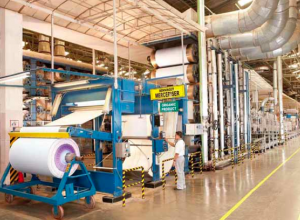 The technical textiles market in India is still in its infancy and remains unorganised. It is also highly import intensive. Estimates suggest that this market will grow at a CAGR of 10 per cent to reach Rs. 146,000 crores ($31 billion) by 2020.
The technical textiles market in India is still in its infancy and remains unorganised. It is also highly import intensive. Estimates suggest that this market will grow at a CAGR of 10 per cent to reach Rs. 146,000 crores ($31 billion) by 2020.
Alok ventured into the made-ups segment by installing wider width (3 metre width) processing house at Vapi, and as forward integration, set up a unit of 100 stitching machines and other allied machines at Vapi. Subsequently, it set up a new factory with 400 stitching machines at Silvassa, taking the capacity to six million sets.
Alok has created a large and prestigious customer base with Wal – Mart, Target and Kohl’s in the home textiles segment. Looking to the good demand the company later on expanded its weaving and processing capacity. The products include sheet-sets, duvets, comforters, blankets, quilts, bed-in-a-bag, curtains in prints, solids, embroidery, sateen’s, flannel, Jacquards, dobbies, yarn dyed from 180 TCs to 1000 TCs.
Within this segment, the terry towel plant was commissioned in 2009-10. It has 48 looms, capable of producing 6,700 tpa and an equivalent amount of terry towel processing capacity.
Home textiles are exported to overseas retailers and brands, sold in the domestic market to retailers and brands, and also distributed through the Indian retail venture ‘H&A’ Stores and the UK-based ‘Store Twenty One’ outlets.
In home textiles, processing capacity is being increased by 22.50 million metres to 105 million metres, while weaving capacity is being raised by 24 million metres to a total capacity of 92 million metres. The terry towel capacity is being doubled to 13,400 tonnes.
Garments
Alok commenced its garment manufacturing operations in 2004 as a pilot project by setting up a unit of 100 stitching machines at Turbhe, Navi Mumbai, with an installed capacity of one million pieces per annum. The company has evolved into a nominated or preferred vendor for big global label and retailers like Mother Care, Carrefour, JC Penny and Kappa. With the removal of quotas and sourcing of garments by the Western countries from low-cost countries like India, garment stitching has become an important value-added service for the buyer. With a view to increasing its production capacity, the company has added 1,547 Juki machines. Currently it has installed capacities of 22 million pieces with 1,647 Juki machines at Silvassa.
While garment sales, especially for export, have encouraging growth potential, there is fierce cost competition. Alok is therefore also looking at increasing capacities through outsourcing, either directly or through its subsidiaries, to low-cost operators, both in India and overseas, especially Bangladesh, where quality garments can be produced at competitive prices.
The work-wear segment, too, offers opportunities for this division to grow. The products include knitted or woven garments for ladies, gents and children, garments for sportswear, active wear, casual wear and sleepwear, garments made from fabrics like solid, mélange, yarn dyed, auto stripes, jacquards, embroidered and variety of prints like transfer prints, and block prints.
Polyester yarn
Alok commenced polyester yarn manufacturing operations in February 1989 at Silvassa with production of 511 tons per annum of texturised yarn. Its present capacity of 1,400 tons per day represents an increase of over 2.50 times of its original capacity per annum, making it the fourth largest fully integrated polyester yarn manufacturer in the country.
The company offers a wide range of polyester products, from partially-oriented yarn (POY), draw texturised yarn (DTY), fully drawn yarn (FDY), dyed yarn, cationic yarn, polyester staple fiber (PSF) and chips.
As a backward integration to texturising, the company ventured into POY manufacturing, with an installed capacity of 54,000 tpa in 2006 through the chip route. Looking to the expansion of texturising capacity and to save on the raw material cost, it has increased the total production capacity of POY from 54,000 tpa to 200,000 tpa. This was done through the continuous polymerization (CP) route in March 2009. Under the CP route, POY is manufactured from PTA and MEG.
Alok Industries expects growth in global demand for polyester yarn and is setting up another CP plant with a capacity of 300,000 tonnes, taking the total capacity to 500,000 tonnes. Of this, 100,000 tpa commenced operation in March last. The company is also increasing the DTY capacity by 56,000 tonnes to create total capacity of 170,000 tonnes.
Future outlook
With an anticipated CAGR of 5.7 per cent for the five-year period 2009-2014, the global textiles market is expected to grow to $1,369.8 billion by the end of 2014. In this growing global market, India has the potential to expand its textiles and apparel output by serving both its domestic and export markets. In fact, given its competitive cost structures, estimates suggest that India’s $70 billion textile and apparel industry has the potential to grow at 11 per cent per annum to reach $134 billion in 2015.
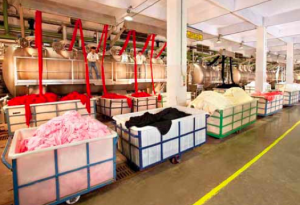 Alok Industries has been gearing itself since last of couple of years to take advantage of these opportunities. It has created large-scale capacities with backward and forward integration, adopted modern technologies, widened its product range and created a flexible set-up to quickly adapt the products to the changing customer needs. Its integration and scale of operation enable the company to produce high quality products at most competitive prices and at lowest lead times. It has a well diversified customer base and has become a reliable sourcing partner for its customers.
Alok Industries has been gearing itself since last of couple of years to take advantage of these opportunities. It has created large-scale capacities with backward and forward integration, adopted modern technologies, widened its product range and created a flexible set-up to quickly adapt the products to the changing customer needs. Its integration and scale of operation enable the company to produce high quality products at most competitive prices and at lowest lead times. It has a well diversified customer base and has become a reliable sourcing partner for its customers.